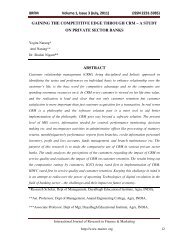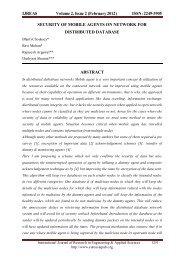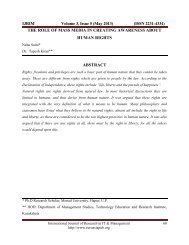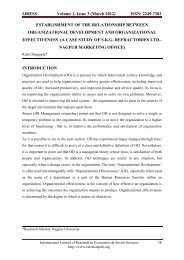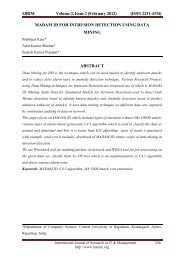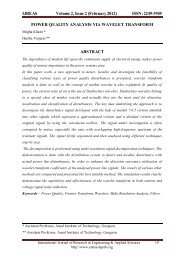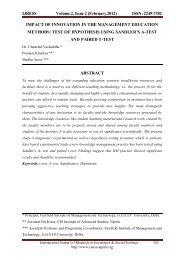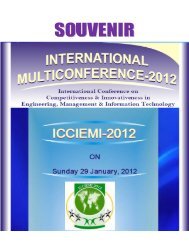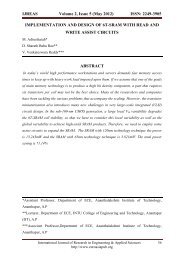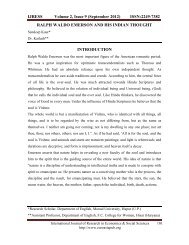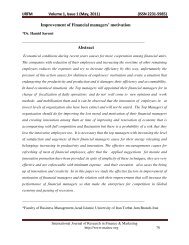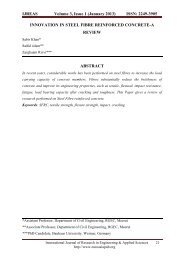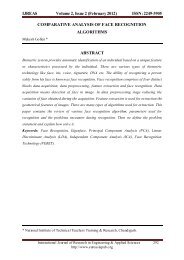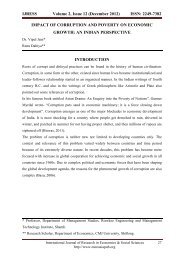the mayor and tess: mounting will, dismounting fate elements of fate ...
the mayor and tess: mounting will, dismounting fate elements of fate ...
the mayor and tess: mounting will, dismounting fate elements of fate ...
You also want an ePaper? Increase the reach of your titles
YUMPU automatically turns print PDFs into web optimized ePapers that Google loves.
IJREAS Volume 3, Issue 6 (June 2013) ISSN: 2249-3905related to her sin. Tess is made to “be a scapegoat by her <strong>fate</strong> because she alone suffers for whatmany o<strong>the</strong>r girls have gotten away with through compromise or secrecy. One's hopes at <strong>the</strong> end<strong>of</strong> <strong>the</strong> novel are focused upon <strong>the</strong> possibility that society, at large, <strong>will</strong> follow Angel's example inaccord with Hardy's general philosophy <strong>of</strong> evolutionary meliorism. Like <strong>the</strong> traditionalscapegoat, Tess is nei<strong>the</strong>r guilty nor innocent. "She is a purely typically or r<strong>and</strong>om victim <strong>of</strong> <strong>the</strong>circumstances her <strong>will</strong> framed around her", remarks Northrop Frye. (41).To sum up, it may be said that one has not a ward to say against <strong>the</strong> concept <strong>of</strong> <strong>will</strong> <strong>and</strong> forceworking behind <strong>the</strong> aspirations <strong>of</strong> The Mayor <strong>of</strong> Casterbrige <strong>and</strong> Tess <strong>of</strong> D’Urbervilles in <strong>the</strong>respective stories. The Mayor's rise <strong>and</strong> fall suggests that if one is an idealist, trying to exert his<strong>will</strong> in an antagonistic or indifferent world, <strong>the</strong>n this action creates a Prome<strong>the</strong>an conflict. And ifone is realist <strong>and</strong> does not attempt to change himself, his chances <strong>of</strong> destruction one minimized.In <strong>the</strong> same way, <strong>the</strong> character <strong>of</strong> Tess, up to her last downfall with some curious exceptions, isconsistent enough. Tess is <strong>the</strong> epitome <strong>of</strong> pure minded girl in whom lie <strong>the</strong> noblest possibilities<strong>of</strong> womanhood to carry out her <strong>will</strong>. But both <strong>of</strong> <strong>the</strong> characters seem to be wronged by <strong>the</strong>ir <strong>fate</strong>.REFERENCES:1. Brooks, J.R. Thomas Hardy: Poetic Structure ( London : Elek, 1971)2. Brown, Doughlas. Thomas Hardy ( London: Longman Green Company, 1967)3. Frye, Northrop. Anatomy <strong>of</strong> Criticism (London: Princeton, 1957)4. Hardy, Thomas. Tess <strong>of</strong> D'Urbervilles. Ed. Dale Skilton (London: Penguine, 1973)5. Hardy, Thomas. The Mayor <strong>of</strong> Casterbridge. Ed. Dale Crammer (London: Oxford UniversityPress, 2004)6. Millgate, Michael. Thomas Hardy: His Career as A Novelist (London: Macmillan, 1971)7. Spivey, Ted R. "Thomas Hardy's Tragic Heroes". Nineteenth Century Fiction, IX (1954)International Journal <strong>of</strong> Research in Engineering & Applied Sciences 47http://www.euroasiapub.org



